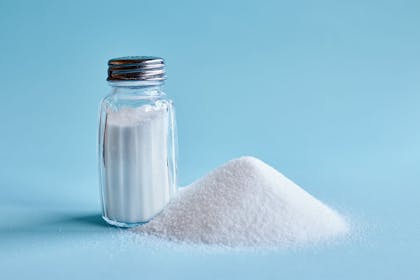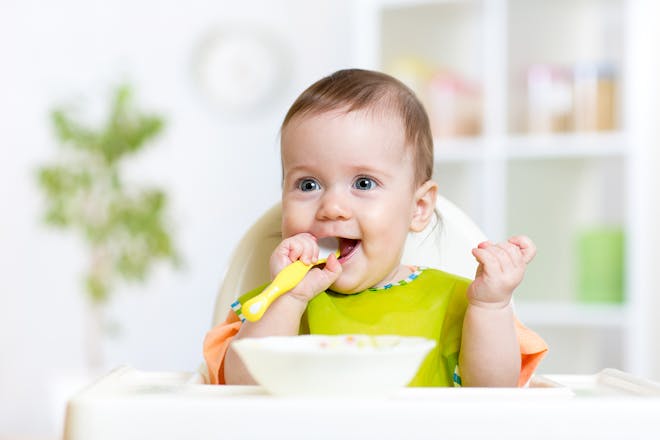When can babies have salt?

Find out when it's safe to give your baby salt, discover how much salt babies and toddlers can have, and learn the symptoms that mean your baby might be having too much salt.
This page contains affiliate links, which means we may earn a small amount of money if a reader clicks through and makes a purchase. All our articles and reviews are written independently by the Netmums editorial team.
The official advice on when babies can have salt
Babies up to 12 months
According to the NHS, babies under 12 months should only have a tiny amount of salt. This is because their kidneys aren't fully developed and can't process it yet.
Babies should have less than 1g of salt a day, which is about one sixth of a teaspoon.
We all need a small amount of the mineral sodium, found in salt, to help our bodies function properly. However, you should avoid giving salt to your baby as they will get all the salt they need from breastmilk or formula milk.
FREE NEWBORN NAPPIES
If your baby is weaning or eating solid foods, avoid adding salt to their food or drink. Don't add stock cubes or gravy, either, as they are both high in salt.
If you're preparing a meal for the family and planning to give some to your baby, make sure you don't add salt during cooking. Instead, add it to the adult meals at the table or at the end of cooking after you've removed your baby's portion.
Shop-bought baby food in the UK doesn't have any added salt and should be fine for your baby, although check the labels on food for toddlers as it may have some salt added.
You should avoid giving your baby salty foods including:

- Ready meals
- Takeaways
- Bacon
- Sausages
- Crisps
- Salted chips
- Crackers not designed for babies
Babies and toddlers over 12 months
The NHS says that babies and toddlers between the ages of 1 and 3 should have no more than 2g of salt a day. That's around a third of a teaspoon.
It's best to avoid adding salt to food you're making for your toddler and avoid giving them processed, salty foods.
Ready meals, snacks and processed foods can be high in salt so always check the ingredients before giving them to babies and young children. Store-cupboard staples such as bread, cereals and tinned foods like baked beans and some tinned vegetables can also be high in salt.
Some foods show the salt content of food on colour-coded nutrition labels on the front of the packaging, making it easier to find low-salt options.
On colour coded labels:
- green means low salt
- amber means medium salt
- red means high salt
You may sometimes see salt listed by its chemical name, sodium chloride or just as sodium.
Why is salt bad for babies?
The occasional taste of something salty, like an olive, won't do your baby any harm. However, having too much salt could damage their kidneys and increase their blood pressure. High blood pressure can raise the risk of heart disease and stroke when your baby's older.
Eating salty food as a baby can also give your child a taste for salty foods throughout their life.
How can I make sure my baby isn't having too much salt
To make sure your baby isn't having too much salt in their diet, follow these simple steps:
- Cook from scratch where possible, using fresh ingredients such as fruits and vegetables, plain meat and fresh fish, pasta, rice, potatoes, eggs etc
- Make sure shop-bought foods, drinks and snacks are designed for babies if your child is under 12 months
- Read labels on shop-bought food to check the salt content
- Avoid giving your child highly processed foods, fast foods and takeaways
- Avoid adding salt, stock cubes, gravy and shop-bought sauces such as ketchup or soy sauce to food
- Cheese can be high in salt so make sure you don't include cheese in every meal
What are the signs and symptoms that my baby's had too much salt?
The effects of eating too much salt can be hard to spot and tend to come on over time. You may notice after eating salty food your baby is thirstier than normal or has darker urine.
If you're worried that your child may by eating too much salt, chat to your GP or health visitor for advice.
No-added salt recipes for babies
These no-added salt recipes are ideal for babies:
- Weaning creamy cod and vegetables
- Sweetcorn puree for babies
- Baby beef stew
- Baby's first pancakes
- Broccoli puree for babies
Looking for more tips on feeding your baby? Check out our articles below, or swap tips and meal ideas with other parents in our forum.
Related stories
7 things a nutritionist wishes parents knew about weaning
Avoid these common choking hazards for babies and children
Need advice?
Our health visitors and nursery nurses are on line Monday to Friday evenings to answer your queries on feeding, sleep and child health.



